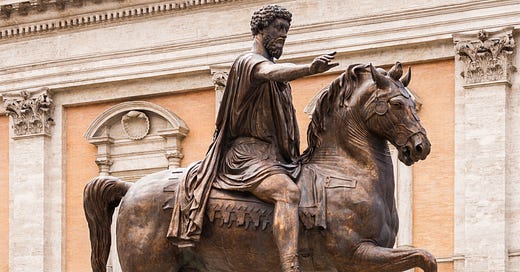For all his theoretical power, Emperor Marcus Aurelius must have often felt impotent.
Far from effortlessly bending the Roman Empire to his will, Marcus was constrained by economic systems, plagues, incompetent and greedy subordinates, Germans pouring over the border, and citizens crying for blood and circus.
Marcus’s journal, Meditations, shows him processing his frustration with these constraints.
He concludes that while he can’t solve the problems, he can do something:
“Tell me, my friend, what are you to do? Do what nature demands of you at this very moment. So set to work, if you are able, and do not look around you to see if anyone will notice. You should not hope for Plato's ideal state, but be satisfied to make even the smallest advance, and regard such an outcome as nothing contemptible.
For who can change the convictions of others? And without that change of conviction, what else is there other than slavery of people who grumble away while making a show of obedience?1”
He couldn’t stop the Antonine Plague, but ensured the poor were buried at state expense.
He couldn’t end slavery, but removed legal constraints to slave manumission.
He couldn’t end poverty, but subsidized food for the poor.
He couldn’t end gladiatorial contests, but ordered combatants to use blunted weapons and subsidized theatrical productions.
He couldn’t make money appear out of thin air, but auctioned his family’s possessions to fund the defense of his people.
Most of us have less power than Marcus, and we might feel we can’t change anything.
But like Marcus, we must “be satisfied to make even the smallest advance, and regard such an outcome as nothing contemptible.”
What does that look like?
We start in the humblest of places, where we have control or a good deal of leverage.
It’s making sure our actions and words line up with virtue, which is one thing we have complete control over.
It’s being cheerful amid the gloom.
It’s getting off social media and reading a book.
It’s sending a handwritten note of gratitude to someone who made a difference in our lives.
It’s getting away from screens and journaling.
It’s finding something broken in our neighborhood and rallying a few neighbors to fix it.
It’s inviting a friend over for dinner or coffee.
Humble? Sure. But this is the small stuff from which revolutions are born, and it’s where our power lies.
Meditations 9.29.




